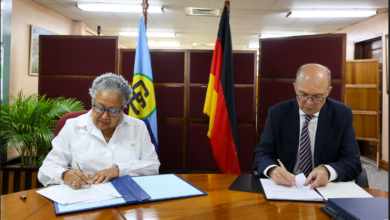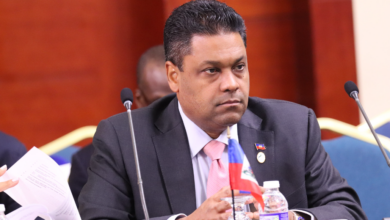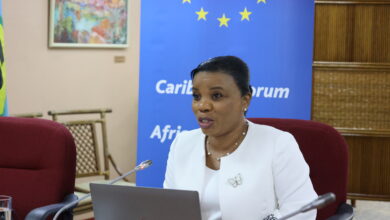Today the Heads of State and Government of the CARICOM countries and the Prime Minister of Spain, Mr. José María Aznar, met in Port-of-Spain (Trinidad and Tobago) for a joint working session at which the Prime Minister of Spain was invited to address the CARICOM leaders.
In the ensuing discussions, the Heads of State and Government of Spain and of CARICOM reviewed a range of political issues and trade and cooperation matters affecting the CARICOM countries and Spain and agreed to issue the following Joint Declaration.
I POLITICAL RELATIONS BETWEEN SPAIN AND CARICOM
The visit to Trinidad and Tobago by the Prime Minister of Spain within the context of his meeting with the Heads of State and Government of the Caribbean constitutes a landmark in relations between the Caribbean countries and Spain, given that it is the first ever institutional contact between a Spanish Head of Government and CARICOM.
The meeting sought to deepen the political, economic and cultural relations between Spain and the CARICOM countries, thus opening a political dialogue which both sides wished to see intensified.
The meeting also served to highlight the excellent relations that exist between Spain and CARICOM and which recognise a historical relationship and a reciprocal desire to enhance mutual understanding and interaction.
Relations within the EU-Caribbean framework
In line with the Rio de Janeiro Declaration, which resulted from the EU-Latin America and Caribbean Summit held recently in the city of the same name, the meeting underlined the common objectives of strengthening representative democracy, the rule of law and pluralism as the foundations for international peace and security, seeking political stability and confidence-building measures among nations, as well as the preservation and respect of individual freedoms.
The CARICOM Heads of State and Government and the Prime Minister of Spain also stressed the universal nature of human rights, as well as the need to ensure the protection and sustainable use of natural resources and also to combat poverty. They welcomed the processes of integration already underway in the Caribbean and in Europe and the excellent results of the First Summit of Heads of State and Government of the EU and Latin America and the Caribbean in Rio de Janeiro, where the bases have been laid for a deeper strategic and institutional relationship between both regions. They were confident that the II Summit to be held in Spain in 2002, would contribute to the consolidation of this strategic relationship.
Spain shares the concern of the Caribbean countries for a definitive regulation of the banana market in the European Union, following the series of complaints to the WTO. Both parties agreed on the need for a definitive solution that provides sufficient safeguards for the interests of the EU’s traditional suppliers, that is, the Community producers and the ACP countries. In this regard, during the lengthy banana market negotiations between the European Union and the WTO, Spain has always advocated a solution which takes account of the interests of the ACP banana producers.
As a member of the European Union, Spain is linked to the Caribbean countries through the Lomé Convention. Negotiations are currently underway for the renewal of the Convention currently in force. Spain advocates the need for a new Convention which is adapted to the circumstances of today’s world and which at the same time preserves the special nature of the deep ties between the ACP countries and the European Union which underpinned previous Lomé Conventions.
The fight against drug trafficking: The CARICOM countries appreciated Spain’s efforts and participation in the EU Project Management Office (Bridgetown) to combat drug trafficking in the Caribbean, within the framework of the UN-led Barbados Plan of Action.
The Parties viewed the fight against drug trafficking as a shared responsibility and expressed their intention to continue their support for the work of the EU-Latin America and the Caribbean coordination and cooperation mechanism which resulted from the initiative of the European Council in Madrid in 1995.
Both parties expressed their firm intention to strengthen international cooperation in the fight against terrorism – based on the principles recognised by the UN, the EU and the OAS – and supported the OAS initiative to put in place a regional framework to help combat terrorism.
Relations in the Regional Framework
The CARICOM Heads of State and Government and the Prime Minister of Spain expressed their satisfaction at the increased and deeper relations between the countries of Latin America and the Caribbean at the bilateral level as well as within the framework of the OAS and by means of cooperation and commercial Agreements between CARICOM and several states of Latin America. They also welcomed the opportunities for dialogue between Latin American Presidents and their CARICOM colleagues, afforded by CARICOM colleagues, outside the Summits and regional and international gatherings.
In particular, both parties welcomed the closer ties forged within the framework of the Association of Caribbean States, in which Spain has participated, with observer status since 1996.
Strengthening Bilateral and Multilateral Relations
The CARICOM Heads of State and Government and the Prime Minister of Spain agreed to strengthen consultations between their respective representatives to the UN, on issues of mutual interest, including those affecting the future functioning of the UN and its dependent bodies.
In this regard, they welcomed the process of reform in the UN and encouraged the Secretary-General to continue his efforts to further this process. They also expressed their hope that the reform will lead to a broad consensus among the member nations, since only in this way will the Security Council have the necessary legitimacy to carry out the important functions entrusted to it under the UN Charter.
Recognising the important role played by Trinidad and Tobago, the signatories also underscored their desire to promote the creation of the International Criminal Court, encouraging countries who have not yet done so to sign its Statutes and also encouraging ratification by those who have already signed.
Spain confirmed its official support for the application of Jamaica to occupy a non-permanent seat on the Security Council for the period 2000-2001.
For their part, the CARICOM countries received with great interest the request to support Spain’s application for a non-permanent seat on the Security Council for the period 2003-2004.
The Heads of State and Government also expressed their intention to ensure the reciprocal accreditation of Ambassadors between Spain and countries of CARICOM and where possible, to increase the reciprocal establishment of resident Embassies, as an expression of their desire for deeper political ties between Spain and the CARICOM countries and to facilitate the level of exchanges.
In the same vein, a commitment was given to promote the exchange of visits at the highest level to favour a dialogue and coordination at the international level and to promote meetings of Heads of State and Government on the margins of the Summits and the UN General Assembly, thus facilitating increased levels of exchange of views on matters of common interest.
II ECONOMIC RELATIONS BETWEEN SPAIN AND CARICOM
The Parties affirmed their commitment to encourage international economic relations and promote trade liberalization, and, within the extent of their possibilities, to help combat the potentially damaging effects of international financial flows.
Given the important role played by investment in economic relations, both Parties expressed their desire to examine the possibilities of negotiating the establishment of Agreements for the protection and reciprocal promotion of investments.
Similarly, the Parties expressed their satisfaction with the increasing interest of Spain and CARICOM companies in establishing business contacts, in accordancce with the desire of the respective countries to boost their trade relations. They also expressed their willingness to support aid programmes for small and medium-sized enterprises.
The CARICOM countries expressed their satisfaction at Spain’s initiative to reduce Belize’s bilateral debt in order to help it recover from the devastation caused by Hurricane Mitch.
The Parties also welcomed with great interest Spain’s willingness to consider its future participation in the Caribbean Development Bank, a participation which will doubtless help encourage the presence of Spanish firms in the Region.
III COOPERATION TIES BETWEEN CARICOM AND SPAIN
The CARICOM Heads of State and Government and the Prime Minister of Spain expressed their satisfaction at the signing of the Agreement on Scientific and Technical Cooperation between CARICOM and Spain. This Agreement will serve as a basis and a point of reference for the future development of cooperation ties between Spain and the countries of the Caribbean. It formalises their desire to further these ties as an expression of friendship and inter- relation between the peoples of the Caribbean and Spain.
The Parties also expressed their common intention for the signature of bilateral Agreements on Scientific and Technical Cooperation between Spain and individual CARICOM members. This process has already begun with the signing of such Agreements between Spain and two CARICOM countries – Trinidad and Tobago and Jamaica.
In recognition that the Spanish language is a cultural contributor and historical point of reference that enriches the diversity of nationalities making up the Caribbean Community, the Parties expressed their support for the participation by Spain in programmes within the Community for the teaching of Spanish in CARICOM countries, and enhancing appreciation of the culture of Spain.
In particular, the Parties welcomed the proposal by the ACS Linguistic Integration Working Group (Basseterre, October 1998), which propitiates and promotes the teaching of the languages of the different members of the Association of Caribbean States.
The Heads of State and Government present in Trinidad and Tobago welcomed the Spanish Government’s intention to extend its Spanish Language Assistant Lecturers Programme to the different campuses of the University of the West Indies (UWI), as an expression of its desire to use this university instrument to promote knowledge of Spanish language and culture.
The Prime Minister of Spain confirmed his country’s willingness for nationals from the CARICOM countries to benefit to a greater degree from scholarships from the Spanish Cooperation Agency and to also benefit from the Training Centre Programmes run by Spain in Latin America. All this will contribute to the training of human resources in areas such as tourism, the environment, the reform and modernisation of the State, economic development and integration processes.
The CARICOM Heads of State and Government also expressed their satisfaction at Spain’s willingness to cooperate in the area of tourism, a starting point being the availability of the International Cooperation Agency’s Hotel and Catering School, which is based in Santo Domingo.
Lastly, the CARICOM Heads of State and Government expressed their gratitude for the help and solidarity shown by the Government and people of Spain during the recent natural disasters that devastated some Caribbean countries.





